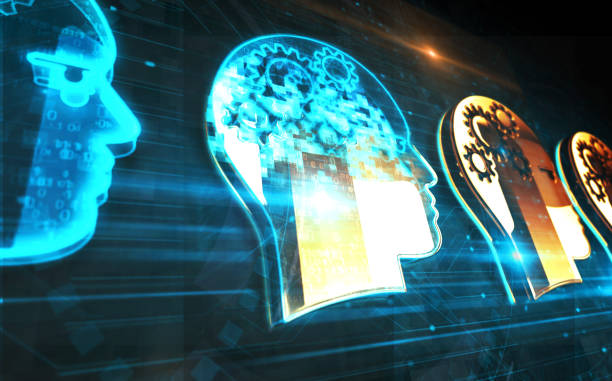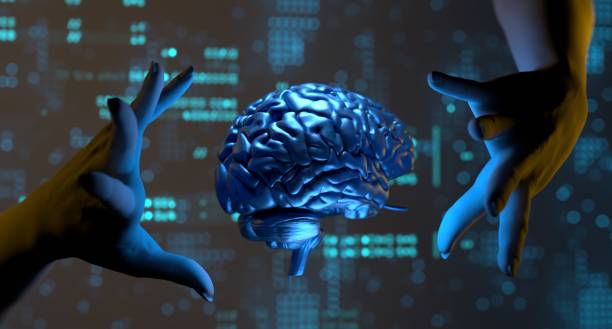What is Artificial Intelligence? Definitions and Key Concepts
#Artificial_Intelligence (AI) is a branch of computer science that deals with building machines capable of performing tasks that typically require human intelligence.
These tasks include learning, reasoning, problem-solving, perception, and natural language processing (NLP) .
The main goal of artificial intelligence is to create systems that can operate automatically and intelligently.
This field includes various sub-branches such as machine learning (Machine learning) , neural networks (Neural Networks) , and robotics.
Artificial intelligence attempts to enable machines to perform tasks that require thought and understanding by simulating human cognitive processes.
Key concepts in artificial intelligence include algorithms, data, and learning models, which are used by systems to learn from their experiences and improve their performance.
Applications of artificial intelligence are expanding in various industries, including medicine, finance, transportation, and manufacturing.
Does your current online store design not generate the sales you expect?
Rasaweb specializes in professional online store design!
✅ Attractive and user-friendly website with the aim of increasing sales
✅ High speed and security for an ideal shopping experience⚡ Get free online store design consultation with Rasaweb!
A Brief History of Artificial Intelligence from Beginning to Today
The history of artificial intelligence dates back to the 1950s, when scientists and researchers began exploring the possibility of building machines capable of thinking.
One of the early milestones was the Turing test in 1950, which was proposed as a benchmark for measuring machine intelligence.
In the 1960s and 1970s, significant advances were made in areas such as problem-solving and natural language processing with the development of new algorithms and increasing computer processing power.
However, hardware and software limitations caused this field to face stagnation, which is known as the “AI winter.”
In the 1980s and 1990s, artificial intelligence was revived with the emergence of machine learning and neural networks.
The development of algorithms such as genetic algorithms and reinforcement learning, made it possible to build more complex and efficient systems.
In the 21st century, with the increase in data volume and hardware advances, artificial intelligence has developed rapidly and has found widespread applications in various fields.
Today, artificial intelligence is recognized as one of the most important technologies in the world and is expected to play a much more important role in human life in the future.
Click here to preview your posts with PRO themes ››
Types of Artificial Intelligence from Expert Systems to Deep Learning
Artificial intelligence can be classified into different types based on capabilities and methods used.
One of the common classifications is based on the level of intelligence of the systems, which includes Narrow AI, General AI, and Super AI.
Narrow AI refers to systems that are designed to perform specific tasks and have limited functionality in the same area.
Examples of this type of artificial intelligence include expert systems, facial recognition, and voice assistants such as Siri and Google Assistant.
General AI refers to systems that are capable of performing any type of task that a human can perform and, in fact, have intelligence equal to or beyond human intelligence.
This type of artificial intelligence has not yet been fully developed and is one of the ambitious goals of research in this area.
Super AI refers to systems that have surpassed human intelligence and are capable of performing tasks that are impossible even for humans.
In addition, artificial intelligence can be classified based on the methods used, which include machine learning, deep learning, neural networks, and natural language processing.
Each of these methods has its own specific tools and techniques and are used in different applications.
| Type of Artificial Intelligence | Description | Example |
|---|---|---|
| Weak AI (Narrow AI) | Designed to perform specific tasks | Expert systems, face recognition |
| Strong AI (General AI) | Capable of performing any task like a human | Not fully developed yet |
| Super AI (Super AI) | Intelligence beyond human intelligence | Impossible at present |
Machine Learning, the Backbone of Artificial Intelligence
Machine learning, as one of the most important sub-branches of artificial intelligence, allows machines to learn from data and improve their performance without explicit programming.
In fact, machine learning uses algorithms and statistical models to identify patterns and relationships in data and uses them to predict or make decisions.
There are different types of machine learning algorithms, including supervised learning, unsupervised learning, and reinforcement learning.
In supervised learning, the machine is trained using labeled data (with correct answers), and the goal is to learn a function that can predict the correct output based on the input.
In unsupervised learning, the machine is trained using unlabeled data, and the goal is to discover patterns and structures in the data.
In reinforcement learning, the machine learns how to make the best decisions by performing different actions in an environment and receiving rewards or penalties in order to maximize its rewards.
Machine learning is used in various applications such as pattern recognition, prediction, classification, and clustering, and plays a very important role in the development of intelligent systems.
Did you know that 94% of users’ first impressions of a business are related to its website design? With professional corporate website design by **Rasaweb**, turn this first impression into an opportunity for growth.
✅ Attract more customers and increase sales
✅ Create credibility and trust in the eyes of the audience⚡ Get a free website design consultation!
Applications of Artificial Intelligence in Various Industries
Applications of artificial intelligence are expanding day by day in various industries and have profound effects on how things are done and how people live.
In the medical industry, artificial intelligence is used in diagnosing diseases, developing drugs, and providing personalized healthcare.
For example, artificial intelligence systems can analyze medical images and identify signs of diseases with greater accuracy.
In the financial industry, artificial intelligence is used in fraud detection, risk management, and providing automated financial services.
Artificial intelligence systems can identify suspicious patterns in financial transactions and prevent fraud from occurring.
In the transportation industry, artificial intelligence is used in the development of self-driving cars, optimizing routes, and managing traffic.
Self-driving cars can understand their surroundings and move without the need for a human driver using sensors and artificial intelligence algorithms.
In the manufacturing industry, artificial intelligence is used in quality control, process optimization, and predicting equipment failures.
Artificial intelligence systems can analyze production data and identify problems before they occur.
In general, applications of artificial intelligence are very broad in various industries, and it is expected that they will play a much more important role in economic and social development in the future.
Challenges and Limitations of Artificial Intelligence
Despite significant advances in the field of artificial intelligence, this technology still faces challenges and limitations that prevent it from fully realizing its potential.
One of the most important challenges is the need for large and high-quality data to train machine learning models.
Machine learning algorithms require a large volume of labeled and clean data to function properly, and collecting and preparing them can be time-consuming and costly.
Another challenge is issues related to ethics and privacy.
Using artificial intelligence in sensitive decision-making such as hiring, lending, and judging can lead to discrimination and inequality.
Also, collecting and using personal data to train artificial intelligence models can violate people’s privacy.
Another limitation is the lack of generalizability of artificial intelligence models.
Models that have been trained for a specific task may not perform well in other tasks.
In addition, artificial intelligence is still not as capable as humans in understanding and interpreting the world and may make mistakes when faced with new and unexpected situations.
To address these challenges and limitations, more research and development of new algorithms is needed.
The Future of Artificial Intelligence: Perspectives and Possibilities
The future of artificial intelligence is very bright and full of possibilities.
With rapid advances in areas such as deep learning, natural language processing, and robotics, artificial intelligence is expected to play a much more important role in human life in the future.
One of the important perspectives is the development of strong artificial intelligence that will be able to perform any type of task like a human.
Strong artificial intelligence can help solve complex problems and provide innovative solutions in various fields.
Another perspective is the integration of artificial intelligence with other technologies such as the Internet of Things (IoT) and blockchain.
This integration can lead to the creation of intelligent and automated systems that are capable of collecting, analyzing, and using data automatically.
Also, artificial intelligence is expected to play a much more important role in areas such as education, health, and the environment in the future.
Artificial intelligence systems can help provide personalized education, diagnose diseases, and manage natural resources.
However, to realize these perspectives, it is necessary to pay attention to the ethical and social issues related to artificial intelligence and to develop appropriate laws and regulations.
| Field | Application of Artificial Intelligence | Potential Effects |
|---|---|---|
| Education | Providing personalized education | Improving the quality of teaching and learning |
| Health | Diagnosing diseases and developing drugs | Improving the level of health and reducing treatment costs |
| Environment | Managing natural resources and reducing pollution | Protecting the environment and sustainability of resources |
Artificial Intelligence and Cybersecurity: Overlap and Conflict
Artificial intelligence plays an important role in cybersecurity, both as a tool to combat cyber threats and as a target for cyberattacks.
On the one hand, artificial intelligence can help identify and prevent cyber attacks.
Artificial intelligence systems can identify suspicious patterns in network traffic and prevent hackers from penetrating.
Also, artificial intelligence can help analyze malware and identify vulnerabilities in systems.
On the other hand, artificial intelligence can be used as a target for cyber attacks.
Hackers can manipulate the data and disrupt the performance of artificial intelligence systems by attacking them.
Also, hackers can use artificial intelligence to automate cyberattacks and increase their efficiency.
To combat these threats, there is a need to develop new security methods and use artificial intelligence to protect artificial intelligence systems.
Are you annoyed by losing customers who visit your site to buy?
Rasaweb is your expert solution for having a successful online store.
✅ Significantly increase your online sales
✅ Create credibility and professional branding with customers⚡ Get free consultation from Rasaweb experts!
Ethical Issues in the Development and Use of Artificial Intelligence
The development and use of artificial intelligence is associated with numerous ethical issues that require careful attention and investigation.
One of the most important issues is accountability.
If an artificial intelligence system makes a wrong decision and causes damage, who will be responsible? Should the designers, manufacturers, or users of the system be held responsible? Another issue is transparency.
How can we ensure that artificial intelligence systems operate fairly and without discrimination? Should artificial intelligence algorithms be fully transparent and auditable? The third issue is privacy.
How can people’s personal data be protected in artificial intelligence systems? Should there be restrictions on the collection and use of personal data? To resolve these ethical issues, there is a need to develop appropriate laws and regulations and create an ethical framework for the development and use of artificial intelligence.
This framework should include principles and guidelines that help designers, manufacturers, and users of artificial intelligence systems make the right ethical decisions.
Artificial Intelligence Learning Resources: Where to Start?
If you are interested in learning artificial intelligence, there are various educational resources available that you can use to start and progress in this field.
One of the best resources is online courses offered by reputable universities and institutions.
Coursera, edX, and Udacity are platforms that offer a variety of courses in artificial intelligence, machine learning, and deep learning.
Other resources include books, scientific articles, blogs, and online forums.
Textbooks can help you fully understand basic concepts, while scientific articles can introduce you to the latest research in this field.
Blogs and online forums can help you ask your questions, connect with other artificial intelligence enthusiasts, and learn from their experiences.
To get started, you can start by learning the basic concepts of mathematics, statistics, and computer science.
Then, you can learn programming languages such as Python and artificial intelligence-related libraries such as TensorFlow and PyTorch.
By practicing and working on practical projects, you can improve your skills in the field of artificial intelligence.
FAQ
| Question | Answer |
|---|---|
| What is artificial intelligence? | It is a simulation of human intelligence in machines programmed to think like humans and mimic their actions. |
| What are the main branches of artificial intelligence? | Includes machine learning, deep learning, natural language processing, computer vision, and robotics. |
| What is Machine Learning? | It is a branch of artificial intelligence that focuses on enabling systems to learn from data and identify patterns without explicit programming. |
| Give examples of artificial intelligence applications in our daily lives. | Voice assistants (such as Siri and Alexa), recommendation systems on Netflix and Amazon, self-driving cars, and facial recognition software. |
| What is Deep Learning? | It is a subset of machine learning that uses multi-layered (deep) artificial neural networks to process large amounts of data. |
| What is Natural Language Processing (NLP)? | It is a branch of artificial intelligence that focuses on enabling computers to understand, interpret, and generate human language. |
| What are some ethical concerns related to artificial intelligence? | Includes bias in data, privacy, job loss, and liability in case of errors. |
| What are the main benefits of artificial intelligence? | Increased efficiency, improved decision-making, automation of repetitive tasks, and discovery of complex patterns in data. |
| How is artificial intelligence used in healthcare? | In diagnosing diseases, discovering drugs, analyzing medical images, and providing personal care to patients. |
| How do you see the future of artificial intelligence? | It is expected to continue to develop at a rapid pace, affecting all aspects of human life, from industry to education and entertainment. |
And other services of Rasa Web Advertising Agency in the field of advertising
Smart Brand Identity: A creative platform to improve click-through rates with smart data analysis.
Smart Marketplace: A professional solution to increase site visits by focusing on accurate audience targeting.
Smart Marketplace: A creative platform to improve customer behavior analysis with dedicated programming.
Smart Digital Advertising: A novel service to increase site visits through SEO-based content strategy.
Smart Social Media: A creative platform to improve customer acquisition with marketing automation.
And more than hundreds of other services in the field of Internet advertising, advertising consulting and organizational solutions
Internet Advertising | Advertising Strategy | Advertorial
Resources
What is analytical AI?
,What is Artificial Intelligence (AI)? – IBM
,What is Artificial Intelligence (AI)? | Oracle
,What is artificial intelligence?
? To reach the peak of success in the digital world, Rasaweb Afrin Digital Marketing Agency introduces your business to a wider range of audiences by offering innovative solutions in multilingual website design and SEO optimization. Shine professionally with us!
📍 Tehran, Mirdamad Street, next to the Central Bank, Kazerun Jonoubi Alley, Ramin Alley No. 6












